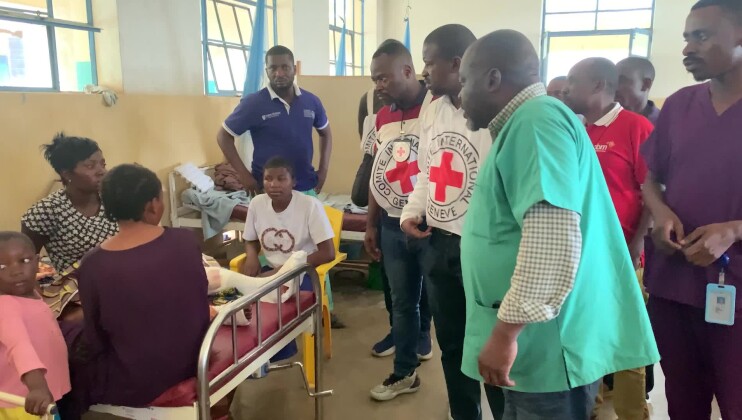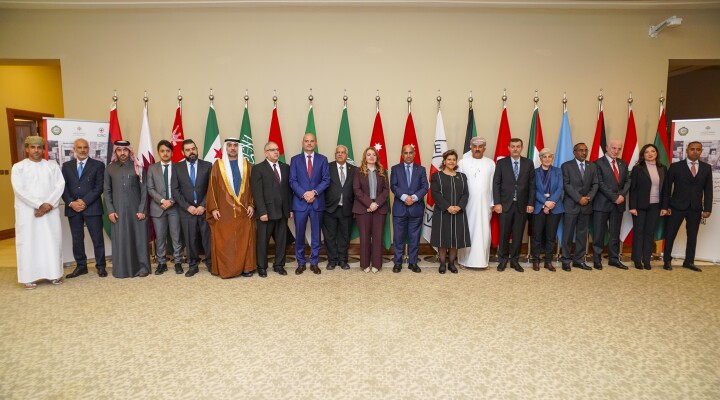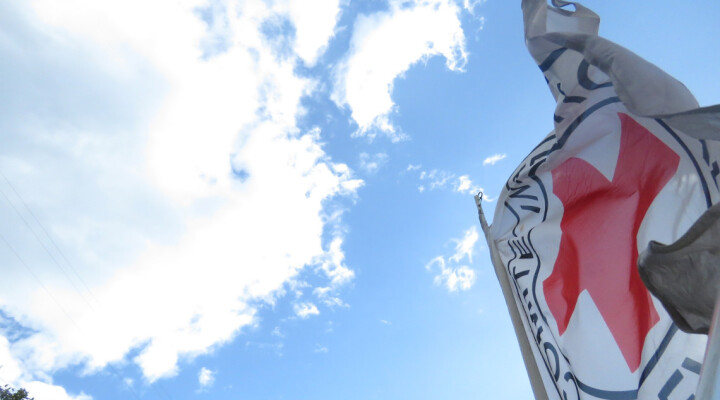Gaza Amputees Turn To Football To Overcome Disabilities And Trauma
Omar was 19 when he lost his leg after a bullet tore through it on May 14, 2018, the worst day in a series of border demonstrations in Gaza. Today, following months of suffering from physical pain and psychological trauma, Omar is sending a ball across the football field with great force and determination. “I asked myself: ‘Until when I am going to stay like this? Depressed and doing nothing,’ and so I started playing football on crutches,” Omar says.
Gaza has some 1,600 amputees among a population of 2 million people. According to the Ministry of Health, 136 people lost limbs since violence escalated in the border areas one year ago. Out of 80 amputee football players, 20 lost their limbs after being injured in the border violence.
The first amputee football team organized a game in Gaza a year ago. This month, a weeklong visit by Simon Baker, the General Secretary of the European Amputee Football Federation, became the first opportunity for the players to receive high-level coaching and hone their skills. It helped boost interest in the amputee football games in the strip, where five new teams were created, and the first tournament attracted crowds of fans.
Invited by the International Committee of the Red Cross (ICRC), Baker trained 15 coaches, 12 referees and 80 amputee players in the Gaza strip. The project will continue in the coming months with the goal of creating a strong team to represent Gaza in international competitions.
Baker lost his leg in 2004 in a building site accident. Since then he has pushed every boundary to prove that amputees can be athletes. ICRC helps people with disabilities fight stigma and gain confidence through sports, as part of its physical rehabilitation program in Gaza.
For further information, please contact:
Alyona Synenko, ICRC Jerusalem, Tel: + 972 526 019 150 Email: asynenko@icrc.org
Suhair Zakkout, ICRC Gaza, Tel: + 972 599 255 381 Email: szakkout@icrc.org
Yehonatan Sabban, ICRC Tel Aviv, Tel: + 972 52 2757517 Email : ysaban@icrc.org
SHOTLIST
Location: Gaza
Length: 12.24 minutes
Format: HD MOV
Camera: Mohammed Nayef
Filming date: 13.04.2019
Copyright: ICRC access all
00:00:00:00 - 00:01:55:11 Omar Abu Hashim, a 20 year old from Rafah, at home preparing to leave the house. He puts on his prosthesis and leaves the house.
00:01:55:11 - 00:03:38:18 Omar arrives to Palestine Stadium in Gaza City. He meets his teammates and warms up. Omar scores a goal during the match.
00:03:38:19 - 00:04:39:05 Omar at a football field in Deir Al Balah during the training.
Interview with Omar Abu Hashim
00:04:39:06 - 00:05:09:00 I was young, I was thirteen years old. I used to play in the streets with my friends. After school, we would just go play outside and stay till sunset. I grew up and started playing in the fields with the guys. I had a goal, I wanted to become a professional player... a famous one
00:05:09:01- 00:05:45:19 A year ago, I participated in the marches… I was hit by a bullet and was taken to the hospital. Two hours later, I was operated on because my leg was in a very bad condition. After waking up, I was told my leg must be amputated and was sent back to the operation room... When I woke up, I was depressed and extremely shaken by what happened to me because I felt that my future was lost.
00:05:45:18 - 00:06:24:09 I returned home after being released from the hospital... I was totally depressed... I would hear young people play football outside. I was very affected by the fact that I used to play and now I am unable due to my injury; I used to do things that I can no longer do.
I started thinking to myself: until when I am going to stay like this? depressed and doing nothing… and so I started playing football on crutches…
00:06:24:10-00:06:52:01 I started to push myself and train with a football team. The guys in the neighborhood played and I would join them... they were passing me the ball… they played “easy” due to my condition… and I continued playing football...
00:06:52:02-00:07:28:24 One day, Palestine Red Crescent contacted me and told me they want me to play football with their team.. the football team of the amputees… For me, it was an opportunity to get back to the field and play and it was an opportunity I wouldn’t miss..
I joined the team and we started training together… we played friendly matches, we would divide the team into two and play against each other.
00:07:29:00-00:07:49:17 Today, I take part in my first tournament ever … I aim and aspire to become the best player with a good reputation despite the injury ... I challenge my disability ... any disability is a disability of the mind not of the body.
00:07:49:18-00:08:57:01 Simon Baker, during a theoretical session with the coaches and referees followed by practical training of the coaches and referees. A coach during the training with the players.
Interview with Simon Baker
00:08:57-00.09.52 It is a great honor to be here working in collaboration with the International Committee of the Red Cross, as part of their physical rehabilitation program. And it is great to roll out this project, amputee football, in Gaza. For me I have a bigger picture, it’s called Amputee Football Project Across the World. We want to work in undeveloped countries and support them with structure of setting it up, with governance. For us to be working with the ICRC in Gaza, it seemed to be the perfect spot to be here, with high number of amputees. It’s a fantastic spot to be in Gaza.
00:09:52- 00:10:37 First and foremost, we give the players some physical activity. The second, this with the International Committee of the Red Cross, we give them crutches, we give them boots, we give them kits and equipment. So now they look like footballers. Now, we have to make them believe that they are footballers and then we’ve got to make them into athletes. Now they are playing football. The next job for us is to take them the next step forward and bring them to the stage where they are playing very entertaining football. It’s entertaining here now. We have to work also, not only with the players, but with the executive committee, government, and to make sure that the goals that we set out are clear, that they are achievable, and that the federation will move toward with them. By doing this, we are getting to see them as athletes, as footballers.
00:10:37 – 00:10:54 It’s a lot we have been saying with the media, you know. They are disabled, but they are not. They are able. They are able to play football. It’s ability football. And once we start telling the players they are athletes and treat them like athletes, they start thinking they are athletes themselves.
00:10:54 – 00.12:18 The program of today. Today, we have a very short quick tournament. Each team will play with each team once. We are teaching them how to make a league and how to run a league. Not just with playing football, with discipline, with organizing, structure, referee, coaches. So, this is just to give them a taste. After this what we are hoping is that we will set them a program. For the next thirty weeks, they will set their league. Each team will play with each other once or twice. And the league will run for six months. After six months, we will come back and will then look to host a tournament. Cup tournament, a Gaza Cup Tournament. From this day, we will look to set the international team, looking for the best players. The end goal for us is to have an international team, so we could bring teams to play here in Gaza or bring the international team from here outside. The ultimate goal is in three years to see a team in the World Cup.



